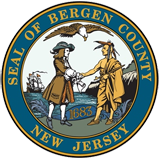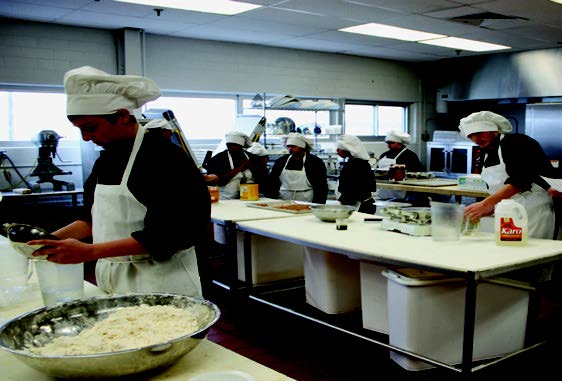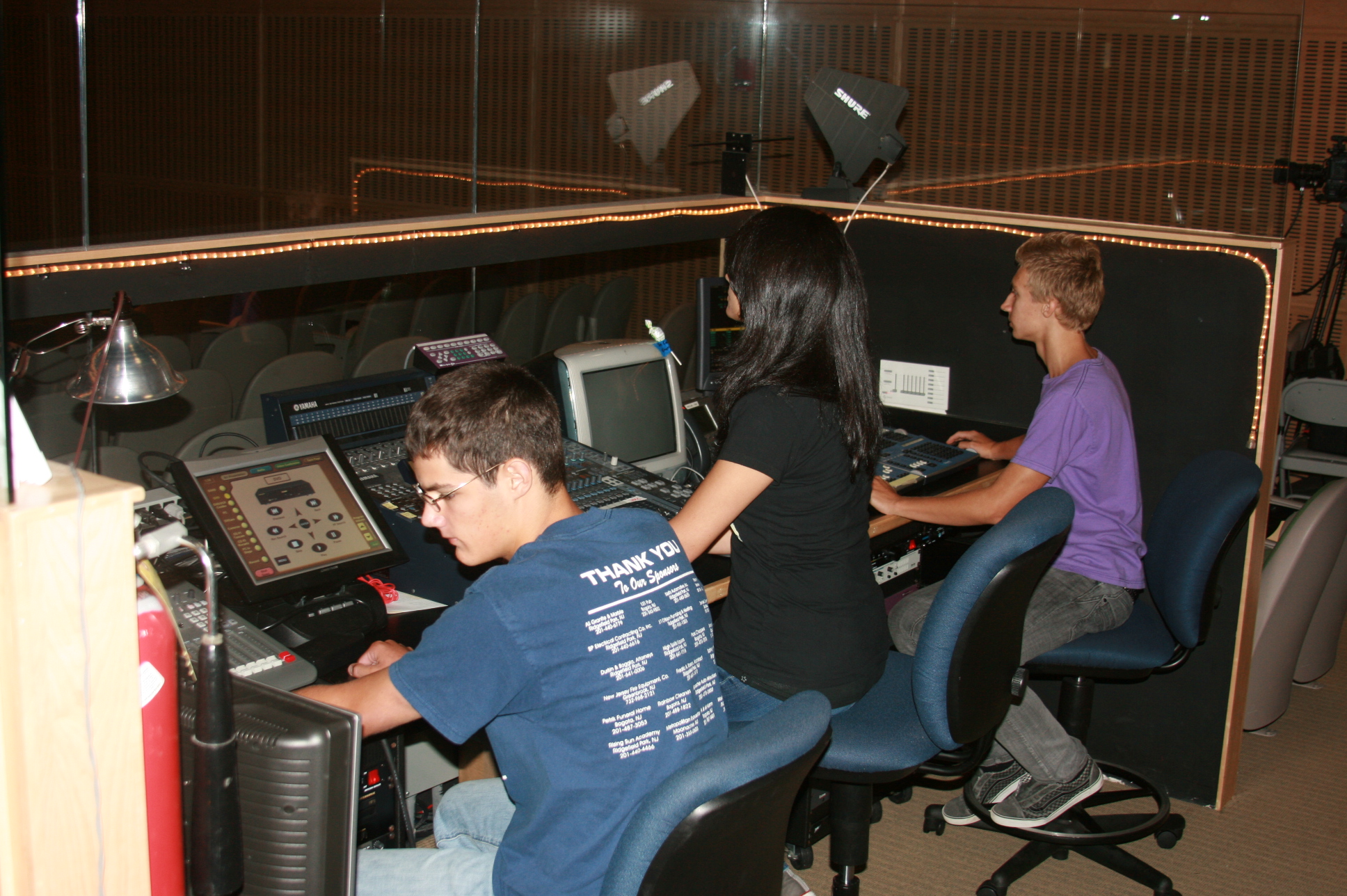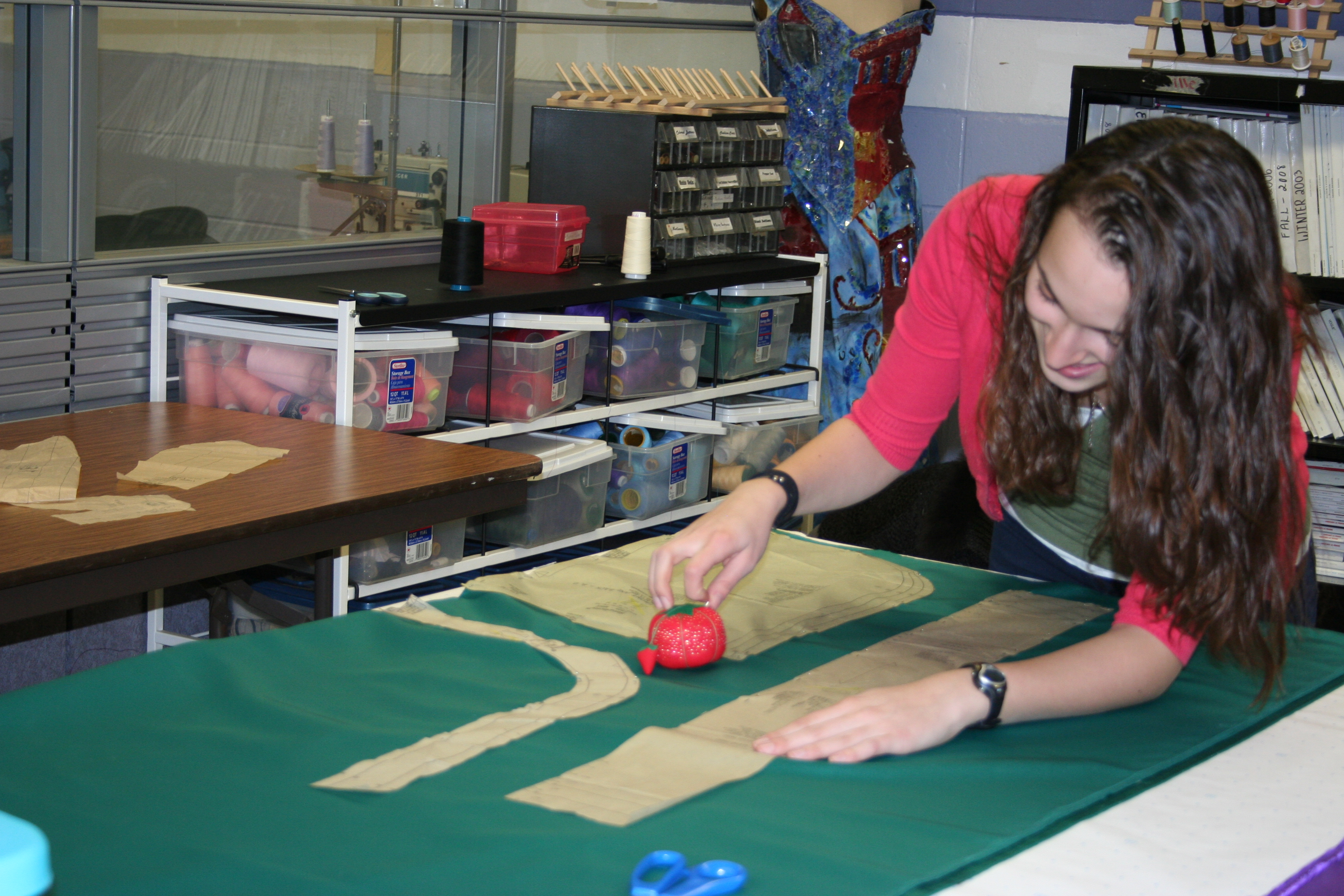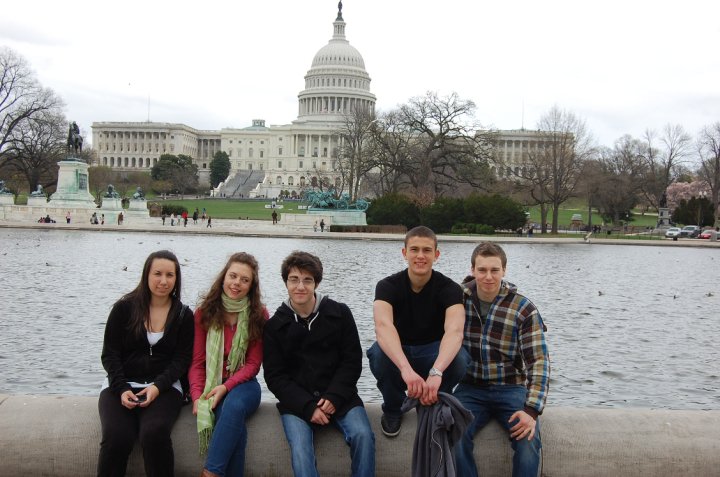Sign up for October 9th will be available October 6th at 8 am.
Uncategorised
Automotive Technology - Hands-on experience helps students learn skills that are fundamental to the automotive technology field. Practical work exposes students to the challenges presented by routine maintenance, diagnosis of problems and procedures for repair of today's automobiles and light trucks.
The Automotive Technology program is a technical program of study that concentrates on a wide range of competencies necessary for the automotive field. Students learn basics such as shop safety, use of tools and equipment, routine repair and vehicle maintenance. Instruction progresses to include the systems of current model automobiles and light trucks, vehicle systems diagnostics, technical reading skills, use of print and online manuals and technical research. Instructors work with students to increase their range of knowledge and skill through demonstrations, simulations and live work. The training facility is up-to-date and offers students a simulated work environment.
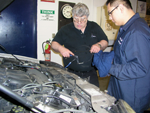 Instructors follow a National Institute for Automotive Service Excellence curriculum. The school tracks stu dent development through a series of competencies and projects that support the ASE course of study. The Automotive Technology program prepares students for work in the automotive field, for postsecondary education and/or for Automotive Service Excellence (ASE) examinations. ASE certification is a recognized professional standard in the automotive service industry and students are encouraged to pursue this recognition.
Instructors follow a National Institute for Automotive Service Excellence curriculum. The school tracks stu dent development through a series of competencies and projects that support the ASE course of study. The Automotive Technology program prepares students for work in the automotive field, for postsecondary education and/or for Automotive Service Excellence (ASE) examinations. ASE certification is a recognized professional standard in the automotive service industry and students are encouraged to pursue this recognition.
Automotive Collision Repair - Students develop expertise in the skills and techniques required for the auto body repair field. Hands-on projects include work on both automobiles and light trucks.
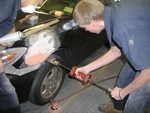
The Automotive Collision Repair program follows a curriculum recommended by the National Institute for Automotive Service Excellence (ASE). The school tracks student development through a series of competencies and projects that supports the ASE course of study in automotive collision repair. Students prepare to take the ASE examinations which lead to ASE certification. ASE certification is a recognized professional standard in the automotive service industry today and students are encouraged to pursue this recognition.
Study in this program includes both theory and hands-on work. Students become experienced in working with auto body fillers, rust proofing materials and primers. Through live work, students learn to remove and replace glass and trim and to spot paint or refinish repaired areas of vehicles. Students learn how to maintain acceptable working conditions, interpret work orders, use hand and power tools, use welding equipment, straighten damaged areas of vehicles and remove and replace 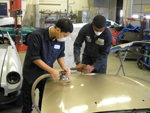 vehicle parts. By the end of the program, students become adept in meeting the demands of today's sophisticated collision repair industry. Program completers take ASE examinations, find field employment or continue their education in a postsecondary school or college.
vehicle parts. By the end of the program, students become adept in meeting the demands of today's sophisticated collision repair industry. Program completers take ASE examinations, find field employment or continue their education in a postsecondary school or college.
Cosmetology - This program involves studies of the hair, scalp, skin and nails. Students work to become well prepared to meet the examination requirements of the New Jersey State Board of Cosmetology.
The curriculum followed in the Cosmetology program prepares students to meet the examination and licensing requirements of the New Jersey State Board of Cosmetology. In addition to theory and classroom work, specialized training is provided through the use of mannequins, demonstrations and live models.
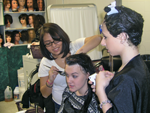 Cosmetology is all about style, health, visual effect and what it takes to achieve that perfect look. Students learn how to select hairstyles that suit the physical features of the patron and how to adapt current styling trends for the individual. Training concentrates on properties of hair and the physical and chemical effects of various products, such as shampoos, rinses, toning and lightening agents, curling and straightening agents and heat-activated agents such as permanents. Students learn how to work with a variety of products in the classroom cosmetology studio. Time and attention are also given to areas such as skin care, make-up, nail care, hand and arm massage, product selection and product application techniques for manicures, make-up and general skin care. Classroom theory includes the chemistry, anatomy and physiology related to the field of cosmetology, ethics of cosmetology, sanitation and sterilization and small business management.
Cosmetology is all about style, health, visual effect and what it takes to achieve that perfect look. Students learn how to select hairstyles that suit the physical features of the patron and how to adapt current styling trends for the individual. Training concentrates on properties of hair and the physical and chemical effects of various products, such as shampoos, rinses, toning and lightening agents, curling and straightening agents and heat-activated agents such as permanents. Students learn how to work with a variety of products in the classroom cosmetology studio. Time and attention are also given to areas such as skin care, make-up, nail care, hand and arm massage, product selection and product application techniques for manicures, make-up and general skin care. Classroom theory includes the chemistry, anatomy and physiology related to the field of cosmetology, ethics of cosmetology, sanitation and sterilization and small business management.
Culinary Arts - Students typically concentrate on Baking or Food Service. Students study all aspects of the field through direct application and development of skills in practical situations.
Students who select the Culinary Arts - Baking option are introduced to the field of commercial baking through direct application of skills in practical situations. Students learn to read and work with commercial recipes, including proportional resizing of recipe quantities, measuring of ingredients and mixing techniques for batters, dough, fillings and icings.Through a combination of classroom work and hands-on practice, students gain expertise in mixing, molding, shaping, designing and baking a variety of breads, pastries and other baked items.
Students who select the Culinary Arts - Food Service option are introduced to the field of commercial foods and food service. Students learn a variety of culinary and food preparation and presentation techniques using foods commonly used in both restaurants, cafeterias and institutional settings. In addition, students learn table service, dining room protocol and business operation for an overall introduction to the culinary arts - food services field.
Whether the area of concentration is Baking or Food Service, instruction in kitchen safety and sanitation, proper use of tools, small equipment, ovens and food handling and storage gives students a foundation for work in the classroom and beyond. Finally, an introduction to business operations gives students an opportunity to connect their kitchen and baking skills or culinary skills to the work enviornment. Graduates are well prepared for positions in the bakery business, commercial kitchens or other food service operation, depending upon the area of preparation and training. Graduates who have successfully completed a college preparatory academic program have the option of going on to postsecondary education.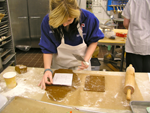
Green Building Trades- This technical area prepares students with the background knowledge and skill sets recognized by professionals in the electrical field. Hands-on projects reinforce classroom knowledge and help students build the skill precision required for work in this technical field.
The Green Building Trades incorporates the latest sustainability practices in construction, electrical design, plumping, masonry and HVAC. Students learning in the green building trades have an opportunity to work with the latest technology such as Vertical Lift Modules (VLM) and take residential construction courses sponsored by the Home Builders Institute (HBI) and National Association of Home Builders (NAHB). The program allows for multiple industry standard certifications in carpentry, plumping, and electrical, as well as certificates through the Occupational Safety and Health Administration (OSHA).
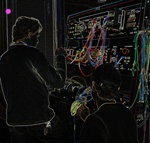
Study in this technical area prepares the student to enter the electrical profession or to pursue a post-secondary education. Students who elect this program must follow a college prep academic program.
General Contracting - Students acquire basic skills in the construction trades. In addition to trade skills, students study building codes and the environmental impact of various building materials and methods.
Students who select the General Contracting program work to develop basic skills commonly used in the construction trades. The curriculum begins with a focus on general safety, electrical safety and the proper use of hand and power tools. Students learn to interpret drawings, calculate materials and understand the various material and fastener options. Study also includes building codes, applicable laws, and issues related to the environmental impact of various building materials and procedures. Students gain skill in rough and finish carpentry and basic plumbing, as well as the wiring of electrical circuits according to code and schematics. The program also explores finishing procedures, surface preparation, and material selection. Various hand-on projects build skill and confidence in the use and application of various procedures, materials and technologies.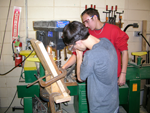
Since preparation for employment is more than skill development, the topic of employability is threaded throughout the program. Students learn how to obtain and maintain a job, practice proper job site clean up and build a working knowledge of professional ethics as related to the field of general contracting.
Computer Networking & Telecommunications - This program provides students with the skills and knowledge they need to sit for the the industry-recognized CompTIA A+ Certification Examination.

Computer Networking & Telecommunications provides students with the skills and knowledge needed to sit for the CompTIA Network+ certification exam. The CompTIA Network+ certification is a vendor neutral international industry credential that validates the knowledge of IT network professionals. The ability to attain this certification proves that a candidate has a broad base of knowledge and competency in core computer hardware, operating system technologies, telecom cabling, networking components, IP configuration, network protocols, wireless and wired networks, and basic network security. The ideal candidate for this program is a problem solver who has demonstrated a clear aptitude in academics. This is a challenging, rapidly growing field that offers tremendous opportunity for a student to pursue further education or employment.
Environmental Design -Students in the Environmental Design program gain experience and knowledge in plant materials, deciduous plants, trees, ornamentals, shrubs, evergreen plants, and ground coverings.
Moving from classroom instruction to practical applications, students learn how to place, plant, and maintain turfs, shrubs, and plantings for beautification of homes, businesses, and community areas. BCTHS/Paramus is proud to partner with Bergen Community College to offer our students the ability to gain six credits at no cost prior to graduation. This partnership exists due to the fact that our program goes far beyond simply the basic mechanics of landscaping.
The most important part of the Environmental Design program is that our students learn the fundamentals of aesthetics and are able to apply them to real world applications. Students become proficient with the essential tools for design (i.e., t-square, French curve, protractor, scale ruler as well as the state of the art Dynascape Computerized Landscape Design program), and conduct work site analysis for design.
ARTICULATED COURSES

- Principles of Landscaping (Bergen Community College- Principles of Landscaping; HRT 113)
- Plants and Materials ( Bergen Community College- Landscape plants and materials; HRT 104)
Healthcare Occupations - Students will be prepared to enter the fast-growing health care field as a valuable assistant and to have strong basic skills to continue health care training in college.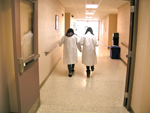
The Medical Office Assistant program allows students to become one of the most important people in the health care field. Graduates of this program will be able to move onto either post secondary studies or enter the workforce immediately upon graduation. Students will acquire the skills necessary to help with the administrative and clinical tasks needed to keep offices and clinics of physicians, podiatrists, chiropractors, and optometrists running smoothly. Study in this program will allow students to become experienced in scheduling appointments, billing, maintaining medical records, purchasing equipment, and arranging for hospital admission and laboratory services. In addition to clerical functions, students will gain experience taking medical histories and recording vital signs, explaining treatment procedures to patients, preparing patients for examination, and assisting the physician during the examination. Medical office assistants also may collect and prepare laboratory specimens or even perform basic laboratory tests, and sterilize medical instruments. They may instruct patients about medication and special diets; or they may draw blood, give injections or other treatments, and change dressings.
Skin Care & Esthetics - This program involves studies of all facets of skin care and make-up artistry, the hair, scalp, skin and nails. Students work to become well prepared to meet the examination requirements of the New Jersey State Board of Cosmetology.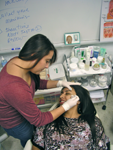
Program Description
Students specializing in Bergen Tech's Esthetician (Skin Care) Program will receive instruction in all facets of skin care and make-up artistry, including numerous methods of spa facials, hair removal, make-up application, color coordination, facial shapes, skin conditions, corrective procedures for problem skin, use of galvanic current machines, body scrubs and polishes, and entrepreneurial science associated with opening and managing a day spa. The program will feature intensive studies of the skin, hair, scalp, and nails emphasizing preventative care and treatment for skin to keep it healthy and attractive. In a unique spa setting, specialized classroom training will be provided through demonstrations, videos, and live models in clinic service.
Training will consist of skin analysis and the study in the physical and chemical effects of skin care products. Correct selection of the products for different skin types and the use of procedures for facials, with and without the use of machines will also be emphasized. Units of study will include nutrition, facials, cosmetics, hair removal and business management. Curriculum is designed to meet examination requirements of the New Jersey State Board of Cosmetology. Classroom theory includes the chemistry, anatomy and physiology related to the field of cosmetology, ethics of cosmetology, sanitation and sterilization and small business management.
Small Animal Care/Vet Tech Assistant- Students work with live animals and learn grooming, veterinary assistance and animal care in the campus small animal care facility.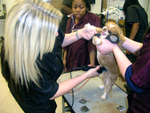
Students in the Small Animal Care/Vet Tech Assistant program learn grooming for all popular breeds of dogs and cats, general health concerns associated with dogs and cats, kennel sanitizing and disinfecting procedures and the safe handling of animals and equipment. The classroom is set-up as a small animal care facility and run as a small business specializing in animal grooming. Accordingly, students also learn office reception procedures, handling of appointments and the maintenance of a computer client database.
Upon successful completion of the program, graduates receive a performance record of skills which summarizes what they have learned. A 1,000 Hours Certificate is also awarded to students who achieve this training hour's milestone. The school arranges work experience and transition programs for students in association with local veterinary hospitals, grooming shops, boarding facilities and large pet retail stores. This aspect of the program helps students secure work upon graduation.
Media Production - This program develops creative talents in students through design technology. Students learn advanced imaging techniques utilizing digital cameras, scanners and industry-standard software
The overall goal of Media Production program is to develop the creative talents and skills of students, as well as to channel those talents and skills for marketability in today's workplaces. This is accomplished through the convergence of skill development in topography, digital and non-digital imagery with creative ideas for the design and production of attractive and effective communications. Students learn color theory, pre-press operations and print production, advanced imaging techniques using digital cameras, scanners and Adobe software (Photoshop, Illustrator and InDesign). Students also learn presentation skills through website design and construction using Dreamweaver and Flash animation software.Program Description
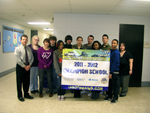
Since the workplace demands deadlines, organizational skills are stressed in the program and students learn to finish work-simulated projects on-time. Project-based learning includes advertising, editorial page design, posters, packaging, and design for books, exhibitions and websites. This program prepares students for entry-level positions in advertising, publishing, and printing industries, as well as the art departments found in corporations and businesses.
Welcome!
Bergen County Technical High School, Teterboro
Virtual Open House
Bergen County Technical High School, Teterboro, is a free public magnet high school of choice for Bergen County residents. The school offers college preparatory academics and exceptional technical training in a dynamic learning environment. It has a full-time honors program with nine technical concentrations which include, Aerospace Engineering; Automotive Engineering and Design; Commercial Art and Graphic Design; Computer Science; Culinology®; Digital Media Arts; Fashion Design and Merchandising; Law and Justice; and Strategic Asset Management.
Open House Session Highlights
- Your primary residence must be in Bergen County, NJ in September 2022, regardless of where you attend school.
- Only 8th grade students can apply.
- If accepted, student will begin 9th grade year in September 2023. Transferring into Bergen County Technical High School is not permitted.
- Complete an Online Application – Online application will open October 1,2022
-
All students applying to the COMART major at Bergen County Technical High School in Teterboro must submit a link to their portfolio at This email address is being protected from spambots. You need JavaScript enabled to view it.. The deadline for submission is November 30, 2022. No postal mail-in portfolio’s will be accepted this year.
Who should attend an Open House?
- Eighth grade students who would like to receive firsthand information about our nine technical programs.
- Please keep in mind that you must be a resident of Bergen County when you complete your online application.
- Students will not be able to attend if they move out of Bergen County.
- We do not accept transfer students or upperclassmen.
For questions, email This email address is being protected from spambots. You need JavaScript enabled to view it..
More information:
- Information about Intership Activities, Clubs and General Information, click here.
- Information about Campus Life, click here.
- See what the students are saying about BCTS Teterboro, click here.
- Information about the Application process, click here.
|
|
|
|
Automotive Engineering and Design |
Strategic Asset Management |
Commercial Art and Graphic Design |
|
|
|
|
Computer Science |
Culinology |
Digital and Media Arts |
|
|
|
|
Fashion Design |
Law and Justice |
Aerospace Engineering |
Bergen County Technical School is very proud to offer our students the opportunity to gain college credits prior to graduating from Teterboro. The classes are taught by our faculty members and are accredited by a college or university. Some of our current offerings are:
• Anatomy & Physiology (Fairleigh Dickinson University)
• Calculus Honors (Fairleigh Dickinson University)
• Global Challenge (Fairleigh Dickinson University)
• Introduction to Sociology (Syracuse University)
• Introduction to Information Technology (NJIT)
• Organic Chemistry (Fairleigh Dickinson University)
Students who elect to take any of these courses must complete a registration form provided by the college, and are responsible for all associated course fees. Each of these early college courses enables the enrolled students to earn three (3) college credits upon successfully completing the course. As per a variety of agreements with BCTS, each college discounts their cost per credit for these courses at an average rate of 30–50 percent. Credits earned will be directly accepted by the institution issuing the credit. However, all earned credits may not be accepted at alternate universities or colleges. It is the discretion of each institution to accept or deny the credits earned at an alternate college or university.
Automotive Engineering & Design
Automotive Engineering & Design is a competency-based instructional program that emphasizes the development of automotive technicians trained for the demands of today’s sophisticated automotive repair, engineering, and laboratory environments. Unlike most traditional automotive programs, AED offers students the opportunity to work with computer-assisted design technology in an engineering-infused environment. The structure of the program emphasizes both theory and opportunity for engagement in a live work process. Students are tracked through a series of proficiencies and projects that support the A.S.E.- and Project Lead the Way- approved curricula. An individual educational plan is designed for each student and individualized instructions implemented throughout the four-year process. The AED Program is unique in that it offers opportunities for discovery in Automotive Fundamentals, Automotive Design, Engineering, Performance, Diagnostics & Repair, Clean Air & Alternative Fuel Technologies, and Navigational Systems that bring automotive students together with other technical disciplines, such as Electronics, Auto Fabrication, Pre-Engineering, and Welding. The Automotive Technology suite is equipped with state-of-the-art diagnostic technology. The service environments designed for production tied to specific competencies sequenced through the advancement of the automotive curriculum, current computer-driven diagnostic, and alignment and colorizing technologies. With experience and with a background in college preparatory academics, students are well prepared for college acceptance, postsecondary technical school placement, or field employment. Students who meet all eligibility criteria become A.S.E. certified. Students may also earn college credit through the Project Lead the Way courses.
Automotive Engineering & Design Program Highlights:• Foundations in Auto Technolog
• Systems Analysis
• Introduction to Engineering Design
• Engineering Design and Development
• Advanced Systems Analysis
• Principles of Engineering (elective)
• Digital Electronics (elective)
• AP Physics B (elective)
• Auto Fabrication and Design Studio
• Dell Winston Solar challenge
• Partnership with BMW
• NATEF Certification
Strategic Asset Management
Strategic Asset Management (S.A.M.) capitalizes on our proximity to New York City—the financial capital of the world—to prepare students for a variety of careers in the financial services sector, including investment and commercial banking, brokerage, trading, and investment management. The program consists of a rigorous academic curriculum that engages students to learn sophisticated content material usually taught at the M.B.A. level. A “theory in action” approach teaches concepts in finance and economics through their impact on financial markets. By focusing on how companies create wealth as well as how investors evaluate risk and growth potential, students will acquire skills and knowledge culminating in the management of investment portfolios on a “live-to-the-market” basis. S.A.M. focuses on the development of skills that provide students with the foundation to enter and be successful at premier college programs, business, or otherwise. Emphasis is on use of the case study method to learn decision making under uncertainty, the use of mathematical reasoning in decision making, and the balance of quantitative and qualitative factors in evaluating alternatives and assessing risk.
Business Program Highlights:
• Introduction to Business Management
• Macroeconomics
• Strategy Formulation
• Derivative Trading
• Microeconomics
• Investment Analysis
• Corporate Finance
• Senior Internship
• Decision Analysis
• Portfolio Management
• Risk Assessment
Commercial Art and Graphic Design
This fast-paced and deadline-oriented program specializes in preparing artists and designers for careers in the world of design, communication, and marketing. Students study every essential aspect of the commercial art field through immersion in curriculum which embraces new technology while still emphasizing traditional skills and principles of art and design. Studio classes include graphic design, multimedia design, web design, advertising & marketing, and electronic prepress technology. Students engage in a real-world curriculum that is driven by high expectations, computer graphics instruction, and current graphic imaging technologies. They are required to maintain a portfolio that exhibits a high degree of creativity as well as technical proficiency. Because of our proximity to the creative epicenter of the world, students have access to internships in hundreds of production houses that support the art and imaging needs of prestigious area businesses.
Commercial Art & Graphic Design Program Highlights:
• Foundations of Graphic Design and Art History
• Fundamentals of 2 Dimensional Design & Drawing
• Graphic Design Studio I Advertising & Market Development
• Graphic Design Studio II Advertising Adobe Illustrator, Photoshop Adobe InDesign Apple iMovie
• Graphic Design Studio III Adobe Go Live Macromedia Flash Animation Flexographic Printing
• Professions Practice in Design• Senior Internship
Computer Science
The Computer Science department is designed to meet the needs of both the student wishing to pursue a career upon graduation and those students planning for undergraduate studies in computer science. The curriculum is aligned with the most recent Cisco curriculum guidelines and evolutions in the field of programming. As such the department offers a good program balance of practical skills and underlying knowledge necessary for adapting to the ever and often changing needs of technology. The program supports research in communications information, network theory, programming, and technology. Fundamental and experimental research pertaining to telecommunications and networking aspects of wide-area, regional, or local area networks; wireless and wired network access, personal communications systems; and inter-networking of various types of networks is supported. Research priorities include efficient design and engineering of high-speed computer and communications networks; advanced modeling techniques and teletraffic theory; dynamic network control; network architecture; network security; and, transmission and switching systems. Students are trained to comprehend, upgrade, operate, repair, program, troubleshoot, and maintain computers. With studies also focusing on computer programming theory, key topics include object-oriented programming and data structures; programming aspects of wide-area, regional, or local area networks; programming languages and applications; wireless and wired network access; and, inter-networking of various types of networks. With emphases on both client- and server-side programming, research priorities include efficient design of a multitude of program types and their application to real problems.
Culinology ®
“The emerging discipline of blending the culinary arts and the science of food.” The Culinology® program blends the science and technology of food production and preservation research with cooking and the culinary arts. BCTHS/Teterboro’s program was approved by the education committee of the Research Chefs Association, and is the first high school program of its kind in the United States. The program offers strong partnerships with corporations such as Pepsi and colleges like Rutgers to provide a unique hands-on experience for students as they complete their course work. Students enrolled in the program who are interested in pursuing an undergraduate degree in the area of Culinology® will be better prepared for the science and technology curricula that they will have to master once they get into college. Students are offered two tracks of study; one that has a stronger food science focus and the other a more culinary science focus. Culinology® graduates are prepared for careers in research and development of food products, new ways to store and manufacture foods, and new products that meet health and safety standards.
Digital and Media Arts
Specializing in Multimedia, New Media, and Broadcast Technologies The Digital Media Arts Program responds to a natural evolution of the modern era. Designed to prepare students for careers as multi-media producers as well as for emerging careers in new media production, state-of-the-art technological tools are built into all courses. The curriculum provides a profession oriented, academically sound education in the art, management, and science of communication through digital multi-media and new media production. At the heart of the process are several campus-based web entities that provide dynamic backdrops for the application of the proficiencies honed through virtually all of the Digital Media courses. Students in the Digital Media Option conceptualize, plan, develop, and create digital content that supports student-managed websites, including an emerging electronic journalism web publication along with additional methods of media distribution that include in-house video programming and broadcast. Designed to prepare students for professional production work, this program introduces those skills required for careers as producers, directors, art directors, production assistants, and writers, as well as emerging careers in new media and immersive technologies for the web.
Digital Media Program Highlights:• Introduction to Digital Media
- Web Development & Design Series
- 2D Graphics
- Advanced Digital Media
- Audio Production
- Animation
- Digital Video Production
- Digital Audio Production Series
- Multi-Media Studio Series
- Senior Internship
- New Advances in Digital Media
Fashion Design & Merchandising
Giving form and function to clothing, Bergen County Technical High School’s Teterboro Fashion Design Program expresses itself in the language of style, ever-changing in harmony with the attitudes of the time and fundamental human need. With increasing high end computer interfaces, students experiment with design concepts and patterns before turning ideas into fashion statements that continue to move the industry forward into new visual and practical territory. The center for the Fashion Design Program is a fully equipped design studio in which students weave their way through the process of color and fabric selection, pattern making, and sewing working from concept to the construction of finished garments. Students study design aesthetics, draping, industrial machines, specialty fabrics, men’s and women’s wear, fashion analysis and criticism, accessories and costume design. Additionally, the Fashion Department incorporates the Gerber Technologies’ computerized systems for Pattern Design, Digitizing, Model Making, Marker Making, Plotting and Automatic Computerized Cutting. Gerber systems are an important part of how clothes are designed and produced today, offering automated and computerized time-saving solutions that have redefined the industry. An annual spring highlight is the program’s fashion show extravaganza presented by the Fashion Design students, who are also introduced to runway arts and poise. The program draws upon college faculty who serve as adjuncts to the program providing workshops in fashion art and design. Fashion Design students consistently receive local and national recognition for their creations and participate in annual Skills USA conferences/competitions and community projects. With academic achievement and high performance in Fashion Design, graduates are well qualified for numerous entry-level positions, as well as entrance into world-renowned fashion design institutes, colleges, and universities.
Law and Justice
The Law & Justice program provides students with an in-depth background in the foundation of laws, law practice, criminology, forensic science, and technical methods used today by various agencies to protect the public. Studies in the foundation of laws from common law to constitutional law, the American system of justice, court structures, the art of debate, and individual rights provided by the Constitution will be analyzed as the basis for understanding the balance between law, justice, and public safety systems. Academic courses will integrate technical writing methods to develop reports, legal briefs, summaries, and arguments utilized to present scientific evidence, legal defenses, and position documents. The program will also offer courses in the history of various public safety agencies and the mathematical principles needed to solve the mechanics of an event. Through emerging partnerships with local, state, and county agencies, members of the Bar and the judicial system, and various specialists employed in judicial and public safety professions, students will be exposed to a variety of immersive experiences in the theoretical, practical, and technical arts and sciences associated with law, criminal justice, and public safety. A student graduating from this program will be able to continue his education at either a two- or four-year college, university, technical school, or law enforcement academy, as well as be employed in support occupations within the judicial and public safety professions.
Aerospace Engineering
The Pre-Engineering Program is a four-year sequence of courses which, when combined with traditional mathematics and science courses, introduces students to the scope, rigor, and discipline of engineering prior to entering college. The curriculum is designed to prepare secondary school students for admission, in some instances with advanced standing, to high-quality engineering schools and, once there, to succeed. Pre-Engineering students take four years of math culminating in calculus, as well as four years of science and three of a foreign language. Pre-Engineering classes begin in grade nine and are co-taught by a Pre-Engineering instructor and a physics teacher. School-to-Careers and Tech Prep activities, such as visits to colleges and exchanges with local engineering firms, are integral to the program. Graduates possess the necessary science and math skills, as well as practical experiences, for entry into most college engineering programs. The technology-infused curriculum is driven by a series of technical practica designed to mesh the hands-on application of engineering theory with rigorous core academics. Pre-Engineering students find themselves functioning in research, design, and development teams built around various real-world engineering problems that form the basis of a variety of engineering projects. In addition to challenging core academics, the engineering sequence includes Principles of Engineering, Engineering Design & Development, Digital Electronics, CAD, and Computer Integrated Manufacturing Systems (CIMS).
|
Pre-Engineering Program Highlights:
|
Internships, Activities, Clubs and More!
Bergen County Technical School is very proud to offer our students the opportunity to gain college credits prior to graduating from Teterboro. The classes are taught by our faculty members and are accredited by a college or university. Some of our current offerings are:
• Anatomy & Physiology (Fairleigh Dickinson University)
• Calculus Honors (Fairleigh Dickinson University)
• Global Challenge (Fairleigh Dickinson University)
• Introduction to Sociology (Syracuse University)
• Introduction to Information Technology (NJIT)
• Organic Chemistry (Fairleigh Dickinson University)
Students who elect to take any of these courses must complete a registration form provided by the college, and are responsible for all associated course fees. Each of these early college courses enables the enrolled students to earn three (3) college credits upon successfully completing the course. As per a variety of agreements with BCTS, each college discounts their cost per credit for these courses at an average rate of 30–50 percent. Credits earned will be directly accepted by the institution issuing the credit. However, all earned credits may not be accepted at alternate universities or colleges. It is the discretion of each institution to accept or deny the credits earned at an alternate college or university.
Automotive Engineering & Design
Automotive Engineering & Design is a competency-based instructional program that emphasizes the development of
automotive technicians trained for the demands of today’s sophisticated automotive repair, engineering, and laboratory environments. Unlike most traditional automotive programs,
AED offers students the opportunity to work with computer-assisted design technology in an engineering-infused environment. The structure of the program emphasizes both theory and opportunity for engagement in a live work process. Students are tracked through a series of proficiencies and projects that support the A.S.E.- and Project Lead the Way- approved curricula. An individual educational plan is designed for each student and individualized instructions implemented throughout the four-year process. The AED Program is unique in that it offers opportunities for discovery in Automotive Fundamentals, Automotive Design, Engineering, Performance, Diagnostics & Repair, Clean Air & Alternative Fuel Technologies,
and Navigational Systems that bring automotive students together with other technical disciplines, such as Electronics, Auto Fabrication, Pre-Engineering, and Welding. The Automotive Technology suite is equipped with state-of-the-art diagnostic technology. The service environments designed for production tied to specific competencies sequenced through the advancement of the automotive curriculum, current computer-driven diagnostic, and alignment and colorizing technologies. With experience and with a background in college preparatory academics, students are well prepared for college acceptance, postsecondary technical school placement, or field employment. Students who meet all eligibility criteria become A.S.E. certified. Students may also earn college credit through the Project Lead the Way courses.
Automotive Engineering & Design Program Highlights: • Foundations in Auto Technology
• Foundations in Auto Technology
• Systems Analysis
• Introduction to Engineering Design
• Engineering Design and Development
• Advanced Systems Analysis
• Principles of Engineering (elective)
• Digital Electronics (elective)
• AP Physics B (elective)
• Auto Fabrication and Design Studio 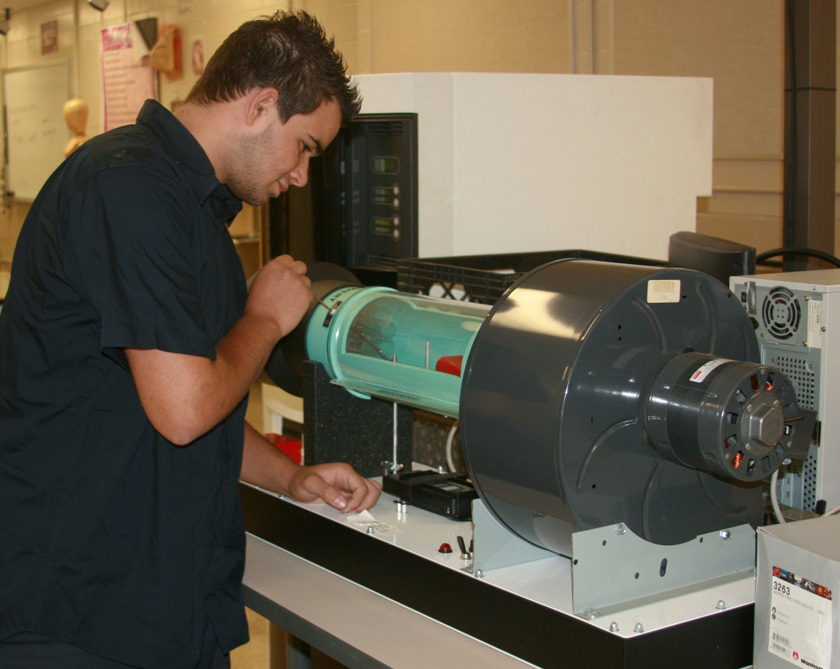 • Dell Winston Solar challenge
• Dell Winston Solar challenge
• Partnership with BMW
• NATEF Certification
Strategic Asset Management
Strategic Asset Management (S.A.M.) capitalizes on our proximity to New York City—the financial capital of
the world—to prepare students for a variety of careers in the financial services sector, including investment and commercial banking, brokerage, trading, and investment management. The program consists of a rigorous academic curriculum that engages students to learn sophisticated content material usually taught at the M.B.A. level. A “theory in action” approach teaches concepts in finance and economics through their impact on financial markets. By focusing on how companies create wealth as well as how investors evaluate risk and growth potential, students will acquire skills and knowledge culminating in the management of investment portfolios on a “live-to-the-market” basis.
S.A.M. focuses on the development of skills that provide students with the foundation to enter and be successful at premier college programs, business, or otherwise. Emphasis is on use of the case study method to learn decision making under uncertainty, the use of mathematical reasoning in
decision making, and the balance of quantitative and qualitative factors in evaluating alternatives and assessing risk.
Business Program Highlights:
• Introduction to Business Management
• Macroeconomics
• Strategy Formulation
• Derivative Trading
• Microeconomics
• Investment Analysis
• Corporate Finance
• Senior Internship
• Decision Analysis
• Portfolio Management
• Risk Assessment
Commercial Art and Graphic Design
This fast-paced and deadline-oriented program specializes in preparing artists and designers for careers in the world of design, communication, and marketing. Students study every essential aspect of the commercial art field through immersion in curriculum which embraces new technology while still emphasizing traditional skills and principles of art and design. Studio classes include graphic design, multimedia design, web design, advertising & marketing, and electronic prepress technology. Students engage in a real-world curriculum that is driven by high expectations, computer graphics instruction, and current graphic imaging technologies. They are required to maintain a portfolio that exhibits a high degree of creativity as well as technical proficiency. Because of our proximity to the creative epicenter of the world, students have access to internships in hundreds of production houses that support the art and imaging needs of prestigious area businesses.
Commercial Art & Graphic Design Program Highlights:
• Foundations of Graphic Design and Art History
• Fundamentals of 2 Dimensional Design & Drawing
• Graphic Design Studio I Advertising & Market Development
• Graphic Design Studio II Advertising Adobe Illustrator, Photoshop Adobe InDesign Apple iMovie
• Graphic Design Studio III Adobe Go Live Macromedia Flash Animation Flexographic Printing
• Professions Practice in Design
• Senior Internship
Computer Science
The Computer Science department is designed to meet the needs of both the student wishing to pursue a career upon graduation and those students planning for undergraduate studies in computer science. The curriculum is aligned with the most recent Cisco curriculum guidelines and evolutions in the field of programming. As such the department offers a good program balance of practical skills and underlying knowledge necessary for adapting to the ever and often changing needs of technology. The program supports research in communications information, network theory, programming, and technology. Fundamental and experimental research pertaining to telecommunications and networking aspects of wide-area, regional, or local area networks; wireless and wired network access, personal communications systems; and inter-networking of various types of networks is supported. Research priorities include efficient design and engineering of high-speed computer and communications networks; advanced modeling techniques and teletraffic theory; dynamic network control; network architecture; network security; and, transmission and switching systems. Students are trained to comprehend, upgrade, operate, repair, program, troubleshoot, and maintain computers. With studies also focusing on computer programming theory, key topics include object-oriented programming and data structures; programming aspects of wide-area, regional, or local area networks; programming languages and applications; wireless and wired network access; and, inter-networking of various types of networks. With emphases on both client- and server-side programming, research priorities include efficient design of a multitude of program types and their application to real problems.
Computer Science Program Highlights: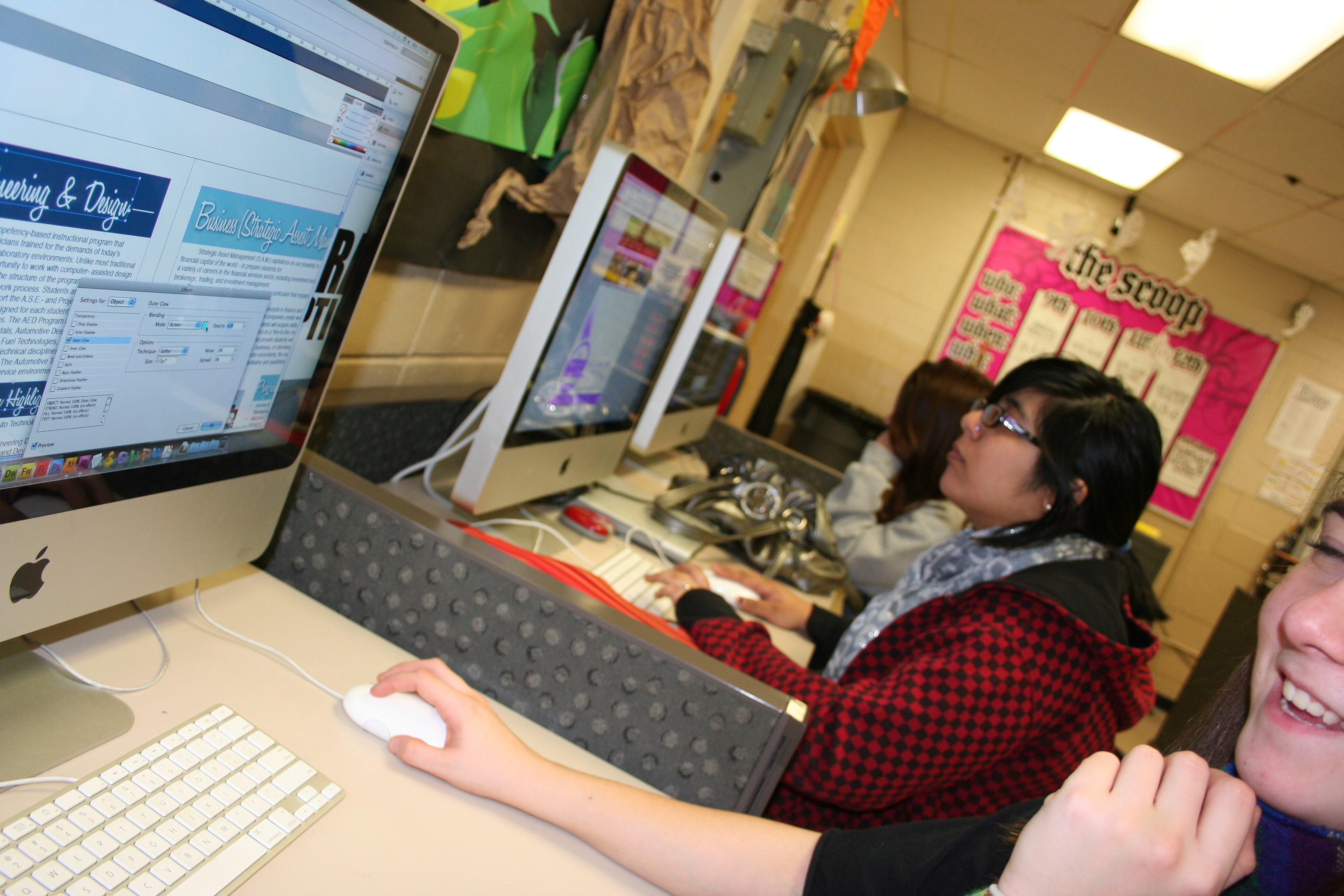
• Survey of Information & Telecommunications Technology
• Information Technology and Telecommunications Essentials • Java Programming
• Introduction to Information Technology • AP Physics B
• Cisco Networking Academy I – Introduction to Networking • Geographical Information Systems
• Cisco Networking Academy II – Advanced Networking • AP Computer Science A
• Business Computers (NJIT College-Level course)
Culinology ®
“The emerging discipline of blending
the culinary arts and the science of food.”
The Culinology® program blends the science and technology of food production and preservation research with cooking and the culinary arts. BCTHS/Teterboro’s program was approved by the education committee of the Research Chefs Association, and is the first high school program of its kind in the United States. The program offers strong partnerships with corporations such as Pepsi and colleges like Rutgers to provide a unique hands-on experience for students as they complete their course work. Students enrolled in the program who are interested in pursuing an undergraduate degree in the area of Culinology® will be better prepared for the science and technology curricula that they will have to master once they get into college. Students are offered two tracks of study; one that has a stronger food science focus and the other a more culinary science focus. Culinology® graduates are prepared for careers in research and development of food products, new ways to store and manufacture foods, and new products that meet health and safety standards.
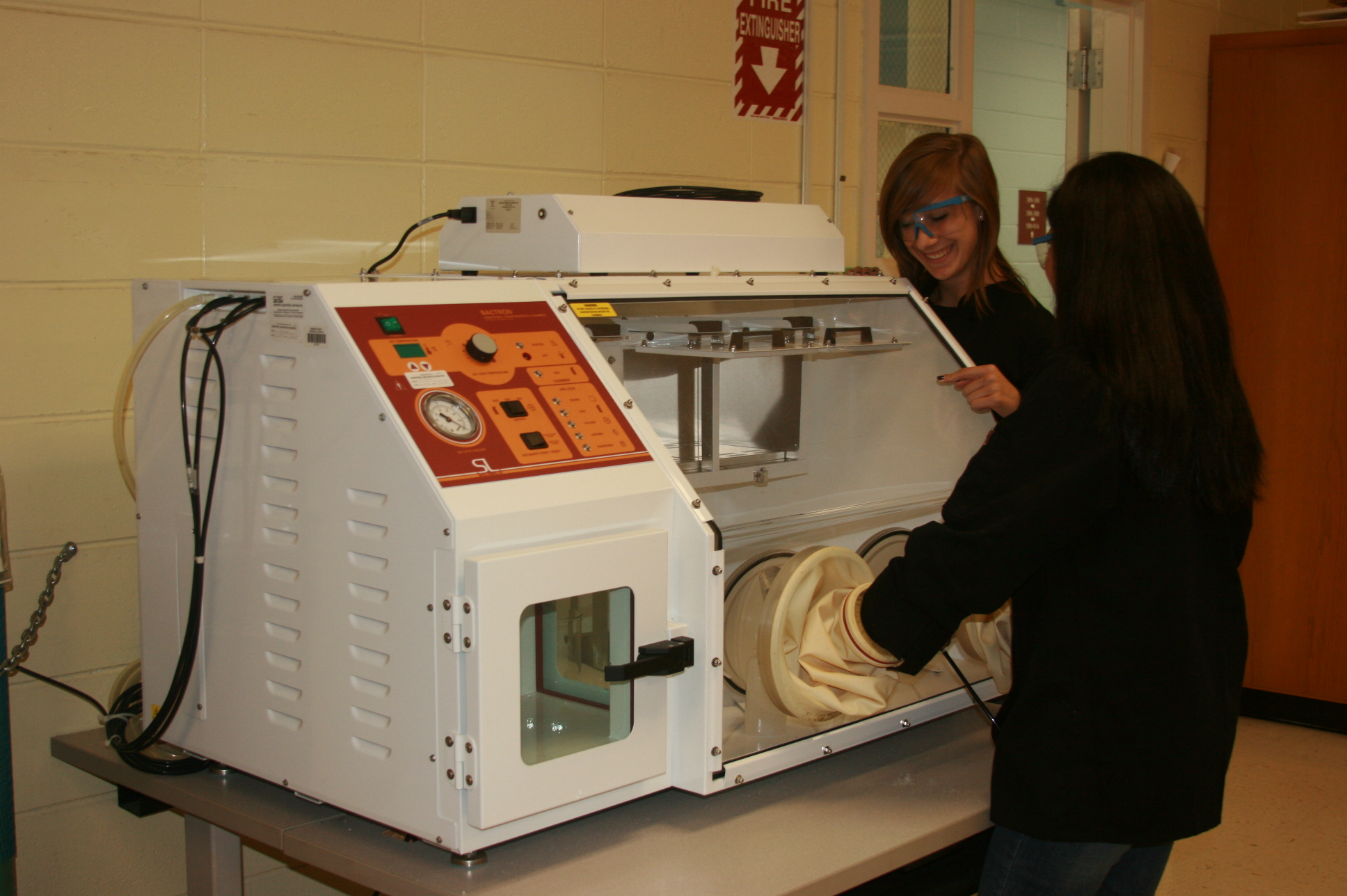 Culinology® Program Highlights:
Culinology® Program Highlights:
• Intro to Culinology®
• Microbiology of Food
• Chemistry of Food
• Culinary Essentials I & II
• Nutrition Food and Health
• Advanced Culinology®
• ServSafe Certification
• AP Biology (elective)
• AP Chemistry (elective)
• Organic Chemistry
• Senior Internship
Digital and Media Arts
Specializing in Multimedia,
New Media, and Broadcast Technologies
The Digital Media Arts Program responds to a natural evolution of the modern era. Designed to prepare students for careers as multi-media producers as well as for emerging careers in new media production, state-of-the-art technological tools are built into all courses. The curriculum provides a profession oriented, academically sound education in the art, management, and science of communication through digital multi-media and new media production. At the heart of the process are several campus-based web entities that provide dynamic backdrops for the application of the proficiencies honed through virtually all of the Digital Media courses. Students in the Digital Media Option conceptualize, plan, develop, and create digital content that supports student-managed websites, including an emerging electronic journalism web publication along with additional methods of media distribution that include in-house video programming and broadcast. Designed to prepare students for professional production work, this program introduces those skills required for careers as producers, directors, art directors, production assistants, and writers, as well as emerging careers in new media and immersive technologies for the web.
Digital Media Program Highlights: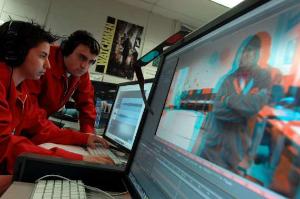 • Introduction to Digital Media
• Introduction to Digital Media
• Web Development & Design Series
• 2D Graphics
• Advanced Digital Media
• Audio Production
• Animation
• Digital Video Production
• Digital Audio Production Series
• Multi-Media Studio Series
• Senior Internship
• New Advances in Digital Media
Fashion Design
Giving form and function to clothing, Bergen County Technical High School’s Teterboro Fashion Design Program expresses itself in the language of style, ever-changing in harmony with the attitudes of the time and fundamental human need. With increasing high end computer interfaces, students experiment with design concepts and patterns before turning ideas into fashion statements that continue to move the industry forward into new visual and practical territory. The center for the Fashion Design Program is a fully equipped design studio in which students weave their way through the process of color and fabric selection, pattern making, and sewing working from concept to the construction of finished garments. Students study design aesthetics, draping, industrial machines, specialty fabrics, men’s and women’s wear, fashion analysis and criticism, accessories and costume design. Additionally, the Fashion Department incorporates the Gerber Technologies’ computerized systems for Pattern Design, Digitizing, Model Making, Marker Making, Plotting and Automatic Computerized Cutting. Gerber systems are an important part of how clothes are designed and produced today, offering automated and computerized time-saving solutions that have redefined the industry. An annual spring highlight is the program’s fashion show extravaganza presented by the Fashion Design students, who are also introduced to runway arts and poise. The program draws upon college faculty who serve as adjuncts to the program providing workshops in fashion art and design. Fashion Design students consistently receive local and national recognition for their creations and participate in annual Skills USA conferences/competitions and community projects. With academic achievement and high performance in Fashion Design, graduates are well qualified for numerous entry-level positions, as well as entrance into world-renowned fashion design institutes, colleges, and universities.
 Fashion Arts Program Highlights:
Fashion Arts Program Highlights:
• Foundations in Fashion Design
• Flat Pattern Design and Gerber Technology
• Textile Studies and Flats & Specs for the Fashion Industry
• Portfolio Illustration and Visual Merchandising
• Flat Pattern Design & clothing Construction
• Fashion Marketing
• Design Development and Fashion Merchandising
• Advanced Flat Pattern Design & clothing Construction
• Senior Internship
Law and Justice
The Law & Justice program provides students with an in-depth
background in the foundation of laws, law practice, criminology, forensic science, and technical methods used today by various agencies to protect the public. Studies in the foundation of laws from common law to constitutional law, the American system of justice, court structures, the art of debate, and individual rights provided by
the Constitution will be analyzed as the basis for understanding the balance between law, justice, and public safety systems. Academic courses will integrate technical writing methods to develop reports, legal briefs, summaries, and arguments utilized to present scientific evidence, legal defenses, and position documents. The program will also offer courses in the history of various public safety agencies and the mathematical principles needed to solve the mechanics of an event. Through emerging partnerships with local, state, and county agencies, members of the Bar and the judicial system, and various specialists employed in judicial and public safety professions, students will be exposed to a variety of immersive experiences in the theoretical, practical, and technical arts and sciences associated with law, criminal justice, and public safety. A student graduating from this program will be able to continue his education at either a two- or four-year college, university, technical school, or law enforcement academy, as well as be employed in support occupations within the judicial and public safety professions.
Law & Justice Program Highlights: • Introduction to Law and the Justice System
• Introduction to Law and the Justice System
• Police Studies & Corrections
• Juvenile Justice
• Family Law
• Forensic Science
• Consumer Law
• Senior Seminar
• AP US Government
• Criminology
• Computer Technology
• Police Studies & Corrections
• Constitutional Law – Case Studies
• Torts
• Senior Internship
• Sociology (elective College Level with Syracuse University)
Aerospace Engineering
The Pre-Engineering Program is a four-year sequence of courses which, when combined with traditional mathematics and science courses, introduces students to the scope, rigor, and discipline of engineering prior to entering college. The curriculum is designed to prepare secondary school students for admission, in some instances with advanced standing, to high-quality engineering schools and, once there, to succeed. Pre-Engineering students take four years of math culminating
in calculus, as well as four years of science and three of a foreign language. Pre-Engineering classes begin in grade
nine and are co-taught by a Pre-Engineering instructor and
a physics teacher. School-to-Careers and Tech Prep activities, such as visits to colleges and exchanges with local engineering firms, are integral to the program. Graduates possess the necessary science and math skills, as well as practical experiences, for entry into most college engineering
programs. The technology-infused curriculum is driven by a series of technical practica designed to mesh the hands-on application of engineering theory with rigorous core academics. Pre-Engineering students find themselves functioning in research, design, and development teams built around various real-world engineering problems that form the basis of a variety of engineering projects. In addition to challenging core academics, the engineering sequence includes Principles of Engineering, Engineering Design & Development, Digital Electronics, CAD, and Computer Integrated Manufacturing Systems (CIMS).
Pre-Engineering Program Highlights:
• Introduction to Engineering and Design
• Honors/AP Mathematics Sequence
• Honors/AP Science Sequence
• Engineering Design Development
• Digital Electronics
• Computer Integrated Manufacturing
• Principles of Engineering
• Civil Engineering & Architecture
• Geographical Information Systems
Welcome!
Bergen County Technical High School, Paramus
Virtual Open House
The Bergen County Technical High School, Paramus has a secondary program to create a learning environment that develops, encourages and supports its students. It has a full-time option for special needs students and a shared-time option for students from local sending districts. Bergen County Technical High School, Paramus Campus is looking for motivated students who are interested in pursuing technical and academic studies leading to a technical career or college placement. Candidates should be in good academic standing with a history of appropriate behavior, acceptable attendance and good relations with teachers and peers.
The Admissions Committee for the Paramus Campus examines the strengths and talents of all applicants. The interest and aptitude of prospective students are carefully considered during the admissions and placement process. Students who are deemed eligible for special eduation are placed in the least restrictive educational environment, according to each student's educational needs and the requirements set forth in state and federal law.
Automotive Collision Repair
Automotive Collision Repair - Students develop expertise in the skills and techniques required for the auto body repair field. Hands-on projects include work on both automobiles and light trucks. The Automotive Collision Repair program follows a curriculum recommended by the National Institute for Automotive Service Excellence (ASE). The school tracks student development through a series of competencies and projects that supports the ASE course of study in automotive collision repair. Students prepare to take the ASE examinations which lead to ASE certification. ASE certification is a recognized professional standard in the automotive service industry today and students are encouraged to pursue this recognition. Study in this program includes both theory and hands-on work. Students become experienced in working with auto body fillers, rust proofing materials and primers. Through live work, students learn to remove and replace glass and trim and to spot paint or refinish repaired areas of vehicles. Students learn how to maintain acceptable working conditions, interpret work orders, use hand and power tools, use welding equipment, straighten damaged areas of vehicles and remove and replace collision2vehicle parts. By the end of the program, students become adept in meeting the demands of today's sophisticated collision repair industry. Program completers take ASE examinations, find field employment or continue their education in a postsecondary school or college.
Automotive Technology
Automotive Technology - Hands-on experience helps students learn skills that are fundamental to the automotive technology field. Practical work exposes students to the challenges presented by routine maintenance, diagnosis of problems and procedures for repair of today's automobiles and light trucks. The Automotive Technology program is a technical program of study that concentrates on a wide range of competencies necessary for the automotive field. Students learn basics such as shop safety, use of tools and equipment, routine repair and vehicle maintenance. Instruction progresses to include the systems of current model automobiles and light trucks, vehicle systems diagnostics, technical reading skills, use of print and online manuals and technical research. Instructors work with students to increase their range of knowledge and skill through demonstrations, simulations and live work. The training facility is up-to-date and offers students a simulated work environment. auto5Instructors follow a National Institute for Automotive Service Excellence curriculum. The school tracks stu dent development through a series of competencies and projects that support the ASE course of study. The Automotive Technology program prepares students for work in the automotive field, for postsecondary education and/or for Automotive Service Excellence (ASE) examinations. ASE certification is a recognized professional standard in the automotive service industry and students are encouraged to pursue this recognition.
Cosmetology
Cosmetology - This program involves studies of the hair, scalp, skin and nails. Students work to become well prepared to meet the examination requirements of the New Jersey State Board of Cosmetology. The curriculum followed in the Cosmetology program prepares students to meet the examination and licensing requirements of the New Jersey State Board of Cosmetology. In addition to theory and classroom work, specialized training is provided through the use of mannequins, demonstrations and live models. Cosmetology is all about style, health, visual effect and what it takes to achieve that perfect look. Students learn how to select hairstyles that suit the physical features of the patron and how to adapt current styling trends for the individual. Training concentrates on properties of hair and the physical and chemical effects of various products, such as shampoos, rinses, toning and lightening agents, curling and straightening agents and heat-activated agents such as permanents. Students learn how to work with a variety of products in the classroom cosmetology studio. Time and attention are also given to areas such as skin care, make-up, nail care, hand and arm massage, product selection and product application techniques for manicures, make-up and general skin care. Classroom theory includes the chemistry, anatomy and physiology related to the field of cosmetology, ethics of cosmetology, sanitation and sterilization and small business management.
Culinary arts
Culinary Arts - Students typically concentrate on Baking or Food Service. Students study all aspects of the field through direct application and development of skills in practical situations. Students who select the Culinary Arts - Baking option are introduced to the field of commercial baking through direct application of skills in practical situations. Students learn to read and work with commercial recipes, including proportional resizing of recipe quantities, measuring of ingredients and mixing techniques for batters, dough, fillings and icings.Through a combination of classroom work and hands-on practice, students gain expertise in mixing, molding, shaping, designing and baking a variety of breads, pastries and other baked items. Students who select the Culinary Arts - Food Service option are introduced to the field of commercial foods and food service. Students learn a variety of culinary and food preparation and presentation techniques using foods commonly used in both restaurants, cafeterias and institutional settings. In addition, students learn table service, dining room protocol and business operation for an overall introduction to the culinary arts - food services field. Whether the area of concentration is Baking or Food Service, instruction in kitchen safety and sanitation, proper use of tools, small equipment, ovens and food handling and storage gives students a foundation for work in the classroom and beyond. Finally, an introduction to business operations gives students an opportunity to connect their kitchen and baking skills or culinary skills to the work enviornment. Graduates are well prepared for positions in the bakery business, commercial kitchens or other food service operation, depending upon the area of preparation and training. Graduates who have successfully completed a college preparatory academic program have the option of going on to postsecondary education.
Green Building Trades
Green Building Trades- This technical area prepares students with the background knowledge and skill sets recognized by professionals in the electrical field. Hands-on projects reinforce classroom knowledge and help students build the skill precision required for work in this technical field. The Green Building Trades incorporates the latest sustainability practices in construction, electrical design, plumping, masonry and HVAC. Students learning in the green building trades have an opportunity to work with the latest technology such as Vertical Lift Modules (VLM) and take residential construction courses sponsored by the Home Builders Institute (HBI) and National Association of Home Builders (NAHB). The program allows for multiple industry standard certifications in carpentry, plumping, and electrical, as well as certificates through the Occupational Safety and Health Administration (OSHA). Study in this technical area prepares the student to enter the electrical profession or to pursue a post-secondary education. Students who elect this program must follow a college prep academic program.
Computer Networking & Telecommunications
Information Technology - This program provides students with the skills and knowledge they need to sit for the the industry-recognized CompTIA A+ Certification Examination. The field of Information Technology--often referred to as IT--is rapidly growing, rapidly changing and continues to offer many opportunities for high paid jobs. The ideal candidate for this program is someone who is a problem solver and who has demonstrated a clear aptitute for academics. This program requires technical reading. The program introduces students to the various aspects of the broad field of information and telecommunications technology. The program concentrates on the development of the skills and knowledge required for the CompTIA A+ Certification Examination. The CompTIA A+ Certification is a vendor-neutral international industry credential that validates the knowledge of computer service technicians. Earning the CompTIA A+ Certification proves that the individual has a broad base of knowledge and competency in core hardware and operating systems, including installation, configuration, diagnostics, preventive maintenance and basic networking. CompTIA is the common acronym used for the Computing Technology Industry Association.
Healthcare Occupations
Healthcare Occupations - Students will be prepared to enter the fast-growing health care field as a valuable assistant and to have strong basic skills to continue health care training in college. The Medical Office Assistant program allows students to become one of the most important people in the health care field. Graduates of this program will be able to move onto either post secondary studies or enter the workforce immediately upon graduation. Students will acquire the skills necessary to help with the administrative and clinical tasks needed to keep offices and clinics of physicians, podiatrists, chiropractors, and optometrists running smoothly. Study in this program will allow students to become experienced in scheduling appointments, billing, maintaining medical records, purchasing equipment, and arranging for hospital admission and laboratory services. In addition to clerical functions, students will gain experience taking medical histories and recording vital signs, explaining treatment procedures to patients, preparing patients for examination, and assisting the physician during the examination. Medical office assistants also may collect and prepare laboratory specimens or even perform basic laboratory tests, and sterilize medical instruments. They may instruct patients about medication and special diets; or they may draw blood, give injections or other treatments, and change dressings.
Environmental Design
Environmental Design -Students in the Environmental Design program gain experience and knowledge in plant materials, deciduous plants, trees, ornamentals, shrubs, evergreen plants, and ground coverings. Moving from classroom instruction to practical applications, students learn how to place, plant, and maintain turfs, shrubs, and plantings for beautification of homes, businesses, and community areas. BCTHS/Paramus is proud to partner with Bergen Community College to offer our students the ability to gain six credits at no cost prior to graduation. This partnership exists due to the fact that our program goes far beyond simply the basic mechanics of landscaping. The most important part of the Environmental Design program is that our students learn the fundamentals of aesthetics and are able to apply them to real world applications. Students become proficient with the essential tools for design (i.e., t-square, French curve, protractor, scale ruler as well as the state of the art Dynascape Computerized Landscape Design program), and conduct work site analysis for design.
ARTICULATED COURSES
- Principles of Landscaping (Bergen Community College- Principles of Landscaping; HRT 113)
- Plants and Materials (Bergen Community College- Landscape plants and materials; HRT 104)
Media Production
Media Production - This program develops creative talents in students through design technology. Students learn advanced imaging techniques utilizing digital cameras, scanners and industry-standard software The overall goal of Media Production program is to develop the creative talents and skills of students, as well as to channel those talents and skills for marketability in today's workplaces. This is accomplished through the convergence of skill development in topography, digital and non-digital imagery with creative ideas for the design and production of attractive and effective communications. Students learn color theory, pre-press operations and print production, advanced imaging techniques using digital cameras, scanners and Adobe software (Photoshop, Illustrator and InDesign). Students also learn presentation skills through website design and construction using Dreamweaver and Flash animation software.Program Description Since the workplace demands deadlines, organizational skills are stressed in the program and students learn to finish work-simulated projects on-time. Project-based learning includes advertising, editorial page design, posters, packaging, and design for books, exhibitions and websites. This program prepares students for entry-level positions in advertising, publishing, and printing industries, as well as the art departments found in corporations and businesses.
Skin Care & Esthetics
Skin Care & Esthetics - This program involves studies of all facets of skin care and make-up artistry, the hair, scalp, skin and nails. Students work to become well prepared to meet the examination requirements of the New Jersey State Board of Cosmetology. Students specializing in Bergen Tech's Esthetician (Skin Care) Program will receive instruction in all facets of skin care and make-up artistry, including numerous methods of spa facials, hair removal, make-up application, color coordination, facial shapes, skin conditions, corrective procedures for problem skin, use of galvanic current machines, body scrubs and polishes, and entrepreneurial science associated with opening and managing a day spa. The program will feature intensive studies of the skin, hair, scalp, and nails emphasizing preventative care and treatment for skin to keep it healthy and attractive. In a unique spa setting, specialized classroom training will be provided through demonstrations, videos, and live models in clinic service. Training will consist of skin analysis and the study in the physical and chemical effects of skin care products. Correct selection of the products for different skin types and the use of procedures for facials, with and without the use of machines will also be emphasized. Units of study will include nutrition, facials, cosmetics, hair removal and business management. Curriculum is designed to meet examination requirements of the New Jersey State Board of Cosmetology. Classroom theory includes the chemistry, anatomy and physiology related to the field of cosmetology, ethics of cosmetology, sanitation and sterilization and small business management.
Small Animal Care / Vet Tech Assistant
Small Animal Care/Vet Tech Assistant- Students work with live animals and learn grooming, veterinary assistance and animal care in the campus small animal care facility. Students in the Small Animal Care/Vet Tech Assistant program learn grooming for all popular breeds of dogs and cats, general health concerns associated with dogs and cats, kennel sanitizing and disinfecting procedures and the safe handling of animals and equipment. The classroom is set-up as a small animal care facility and run as a small business specializing in animal grooming. Accordingly, students also learn office reception procedures, handling of appointments and the maintenance of a computer client database. Upon successful completion of the program, graduates receive a performance record of skills which summarizes what they have learned. A 1,000 Hours Certificate is also awarded to students who achieve this training hour's milestone. The school arranges work experience and transition programs for students in association with local veterinary hospitals, grooming shops, boarding facilities and large pet retail stores. This aspect of the program helps students secure work upon graduation.
